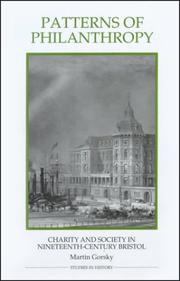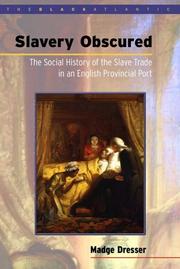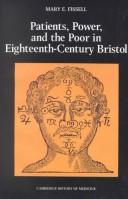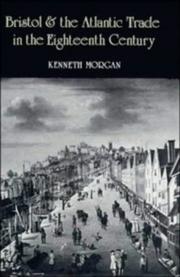| Listing 1 - 10 of 17 | << page >> |
Sort by
|

ISBN: 0861932455 9781843836377 Year: 1999 Publisher: [London] : Woodbridge, Suffolk, UK ; Rochester, NY, USA : Royal Historical Society ; Boydell Press,
Abstract | Keywords | Export | Availability | Bookmark
 Loading...
Loading...Choose an application
- Reference Manager
- EndNote
- RefWorks (Direct export to RefWorks)
A study of the debate over the control of civic charities during the era of municipal reform.The nineteenth-century city was characterised by the development of a wide variety of voluntary associations and institutions which set out to address social problems and promote the public good. This book presents a study of voluntarism in the city of Bristol. Attention is focused first on the long-established endowed charities which funded poor relief, almshouses and schools; the author charts the decline of this form of giving in favour of the new benevolent associations of the eighteenth century, reflecting the centrality of the debate over the control of civic charities during the era of municipal reform. The book moves on to look in more depth at the city's many voluntary organisations and societies, presenting a comprehensive picture of developments up to 1870 in such fields as health, education and missionary work to the poor. This is followed by an analysis of the social impact of voluntary activity, and a survey of the limitations of voluntary sector welfare provision
History of the United Kingdom and Ireland --- anno 1800-1899 --- Bristol --- Bristol [England] --- Charities --- Voluntarism --- History
Book
ISBN: 0140803165 Year: 1979 Publisher: Harmondsworth Penguin books
Abstract | Keywords | Export | Availability | Bookmark
 Loading...
Loading...Choose an application
- Reference Manager
- EndNote
- RefWorks (Direct export to RefWorks)
#SBIB:39A6 --- #SBIB:39A72 --- #SBIB:39A5 --- #SBIB:316.7C130 --- West Indians --- -Ethnology --- Etniciteit / Migratiebeleid en -problemen --- Etnografie: Europa --- Kunst, habitat, materiële cultuur en ontspanning --- Groepscultuur en subculturen --- Social life and customs --- Bristol (England) --- -Bristol (England) --- -Race relations --- -Etniciteit / Migratiebeleid en -problemen --- Ethnology --- Bristol, Eng. --- Corporation of the City of Bristol (England) --- Bristol (Avon) --- City of Bristol (England) --- City and County of Bristol (England) --- City & County of Bristol (England) --- Bristol (England : Unitary authority) --- Race relations. --- Social life and customs.

ISBN: 1474291716 1474291708 9781474291705 9781474291699 1474291694 9780826448750 0826448755 0826448763 9780826448767 Year: 2018 Publisher: London : Bloomsbury Publishing,
Abstract | Keywords | Export | Availability | Bookmark
 Loading...
Loading...Choose an application
- Reference Manager
- EndNote
- RefWorks (Direct export to RefWorks)
"Slavery Obscured aims to assess how the slave trade affected the social life and cultural outlook of the citizens of a major English city, and contends that its impact was more profound than has previously been acknowledged. Based on original research in archives in Britain and America, this title builds on scholarship in the economic history of the slave trade to ask questions about the way slave-derived wealth underpinned the city of Bristol's urban development and its growing gentility. How much did Bristol's Georgian renaissance owe to such wealth? Who were the major players and beneficiaries of the African and West Indian trades? How, in an ever-changing historical environment, were enslaved Africans represented in the city's press, theatre and political discourse? What do previously unexplored religious, legal and private records tell us about the black presence in Bristol or about the attitudes of white seamen, colonists and merchants towards slavery and race? What role did white women and artisans play in Bristol's anti-slavery movement? Combining a historical and anthropological approach, Slavery Obscured, seeks to shed new light on the contradictory and complex history of an English slaving port and to prompt new ways of looking at British national identity, race and history."--Bloomsbury Publishing.
Slave trade --- Slavery --- History. --- Bristol (England) --- Social conditions.

ISBN: 0521400473 9780521400473 Year: 1991 Publisher: Cambridge Cambridge University press
Abstract | Keywords | Export | Availability | Bookmark
 Loading...
Loading...Choose an application
- Reference Manager
- EndNote
- RefWorks (Direct export to RefWorks)
Medicine --- Poor --- History --- Medical care --- Social life and customs. --- -Poor --- -Disadvantaged, Economically --- Economically disadvantaged --- Impoverished people --- Low-income people --- Pauperism --- Poor, The --- Poor people --- Persons --- Social classes --- Poverty --- Clinical sciences --- Medical profession --- Human biology --- Life sciences --- Medical sciences --- Pathology --- Physicians --- -Medical care --- -History --- -Social life and customs --- Economic conditions --- Bristol (England) --- Disadvantaged, Economically --- Social life and customs --- Bristol, Eng. --- Corporation of the City of Bristol (England) --- Bristol (Avon) --- City of Bristol (England) --- City and County of Bristol (England) --- City & County of Bristol (England) --- Bristol (England : Unitary authority) --- Health Workforce --- Medicine - England - Bristol - History - 18th century. --- Poor - Medical care - England - Bristol - History - 18th century. --- Poor - England - Bristol - Social life and customs.

ISBN: 0521330173 0521893674 0511522738 9780521330176 9780511522734 9780521893671 Year: 1993 Publisher: Cambridge Cambridge University Press
Abstract | Keywords | Export | Availability | Bookmark
 Loading...
Loading...Choose an application
- Reference Manager
- EndNote
- RefWorks (Direct export to RefWorks)
This book offers the first detailed examination for many years of the transatlantic trade and shipping of Bristol during the eighteenth century. It compares the performance of Bristol as a port during this period with the growth of other out ports, especially Liverpool and Glasgow. Dr Morgan's analysis shows that the absolute growth of Bristol's Atlantic trade between 1700 and 1800 was concomitant with the relative decline of Bristol as a port; the main reasons for this decline were the lack of improvement to port facilities, increasing specialisation among the Bristol merchant community, the impact of war on trade, and the superior business acumen in the tobacco and slave trades manifested by Glasgow and Liverpool merchants respectively. Bristol and the Atlantic Trade is based on a great variety of primary sources in the British Isles, the USA, the West Indies, Australia and continental Europe.
Shipping --- Merchant marine --- Bristol (England) --- History --- Commerce --- Arts and Humanities --- Shipping - England - Bristol - History - 18th century. --- Merchant marine - Great Britain - History - 18th century. --- Bristol (England) - Commerce - History - 18th century. --- Great Britain --- America --- Colonies --- Marine shipping --- Marine transportation --- Maritime shipping --- Ocean --- Ocean traffic --- Ocean transportation --- Sea transportation --- Shipping industry --- Water transportation --- Communication and traffic --- Marine service --- Transportation --- Mercantile marine --- Economic aspects --- Americas --- New World --- Western Hemisphere --- Bristol, Eng. --- Corporation of the City of Bristol (England) --- Bristol (Avon) --- City of Bristol (England) --- City and County of Bristol (England) --- City & County of Bristol (England) --- Bristol (England : Unitary authority)

ISBN: 0520084497 052091452X 0585181624 9780520914520 9780585181622 9780520071483 0520071484 9780520084490 0520071484 Year: 1991 Volume: 15 Publisher: Berkeley University of California press
Abstract | Keywords | Export | Availability | Bookmark
 Loading...
Loading...Choose an application
- Reference Manager
- EndNote
- RefWorks (Direct export to RefWorks)
The history of capitalism is not to be explained in mere economic terms. David Harris Sacks here demonstrates that the modern Western economy was ushered in by broad processes of social, political, and cultural change. His study of Bristol as it opened it gate to national politics and the Atlantic economy reveals capitalism to be not just a species of economic order but a distinct form of life, governed by its own ethical norms and cultural practices. Availing himself of the methods of "thick description," socio-economic analysis, and political theory, Sacks examines the dynamics by which early modern Bristol moved from a medieval commercial economy to an early capitalist one. Throughout the period, the life of the city depended heavily on the successes of its great overseas merchants. But their quest for a monopoly of trade with the outside world, from the Atlantic seaboard to the Levant, came into conflict with the concerns of Bristol's artisans and retail shopkeepers. The battles of the two factions conditioned social and cultural developments in Bristol for two centuries. Locally, the conflict set the terms for developing conceptions of justice and authority. On a larger scale, it drew the community firmly into the great affairs of the realm and the wider world of expanding markets beyond.
Capitalism --- Economic History --- Business & Economics --- History. --- History --- Bristol (England) --- Economic conditions. --- Commerce --- Market economy --- Bristol, Eng. --- Corporation of the City of Bristol (England) --- Bristol (Avon) --- City of Bristol (England) --- City and County of Bristol (England) --- City & County of Bristol (England) --- Bristol (England : Unitary authority) --- Economics --- Profit --- Capital --- artisans. --- atlantic economy. --- atlantic seaboard. --- authority. --- bristol. --- capitalism. --- city life. --- cultural change. --- cultural practices. --- early capitalist economy. --- economic conditions. --- economic history. --- economics. --- english history. --- ethical norms. --- ethics. --- history of capitalism. --- justice. --- levant. --- medieval commercial economy. --- merchandise. --- merchants. --- modern western economy. --- monopoly. --- national politics. --- overseas merchants. --- pilgrimage. --- political change. --- political theory. --- retail shopkeepers. --- social change. --- thick description. --- urban life.
Book
ISBN: 1908363126 1784504459 9781784504458 9781785921735 Year: 2020 Publisher: London Philadelphia
Abstract | Keywords | Export | Availability | Bookmark
 Loading...
Loading...Choose an application
- Reference Manager
- EndNote
- RefWorks (Direct export to RefWorks)
Holistic medicine. --- Cancer --- Patients. --- Pilkington, Pat. --- Bristol Cancer Help Centre. --- Penny Brohn Cancer Care (Charity) --- England
Book
ISBN: 0710084307 Year: 1976 Publisher: London Routledge & Kegan
Abstract | Keywords | Export | Availability | Bookmark
 Loading...
Loading...Choose an application
- Reference Manager
- EndNote
- RefWorks (Direct export to RefWorks)
History of the United Kingdom and Ireland --- anno 1800-1899 --- City and town life --- Recreation --- Urbanization --- History. --- Bristol (England) --- Recreational activities
Book
ISBN: 9781848935617 1848935617 1781447705 9781781447703 Year: 2016 Publisher: London Routledge
Abstract | Keywords | Export | Availability | Bookmark
 Loading...
Loading...Choose an application
- Reference Manager
- EndNote
- RefWorks (Direct export to RefWorks)
Prostitution --- Port cities --- Prostitutes --- Women --- Port cities. --- Prostitution. --- Hafenstadt --- Soziale Kontrolle --- Social Conditions --- History --- Social conditions --- Social conditions. --- history. --- 1700-1799 --- Europe. --- Bristol. --- Nantes. --- Hafenstadt. --- Soziale Kontrolle. --- 1700-1799.
Book
ISBN: 9781845457457 9781845457419 1845457412 1845457455 Year: 2010 Volume: 4 Publisher: New York Berghahn
Abstract | Keywords | Export | Availability | Bookmark
 Loading...
Loading...Choose an application
- Reference Manager
- EndNote
- RefWorks (Direct export to RefWorks)
Introduction : theorising media and practice / John Postill ## Media as practice. Theorising media as practice / Nick Couldry ## What do we mean by 'media practices'? / Mark Hobart ## Media as practice: a brief exchange / Nick Couldry and Mark Hobart ## Media, culture and practice. From fan practice to mediated moments: the value of practice theory in the understanding of media audiences / S. Elizabeth Bird ## Thick context, deep epistemology: a meditation on wide-angle lenses on media, knowledge production and the concept of culture / Debra Spitulnik ## "But it is my Hhbit to read the Times": metaculture and practice in the reading of Indian newspapers / Mark A. Peterson ## Embedded/embedding media practices and cultural production / Ursula Rao ## Media practices in context. Communication, cognition and usage: epistemological considerations of media practices and processes / Guido Ipsen ## Language-games, in/dividuals and media uses: what a practice perspective should imply for media studies / Jo Helle-Valle ## A barthian approach to practice and media: Internet engagements among teleworkers in rural Denmark / Jens Kjaerulff ## Can practice theory inspire studies of ICTs in everyday life? / Toke H. Christensen and Inge Ripke ## New media production practices. Playful pactices: theorising 'new media' cultural production / Elisenda Ardèvol ... [et al.] ## Theorising the practices of free software: the movement / Christopher M. Kelty ## Cinematography and camera crew: practice, process and procedure / Cathy Greenhalgh.
Anthropologie --- --Mass-media --- --Culture --- --Colloque --- --2006 --- --Bristol --- --actes --- --Mass media and anthropology --- Mass media and culture --- Mass media --- Research --- Mass media and anthropology --- #SBIB:309H1000 --- #SBIB:309H1016 --- #SBIB:39A8 --- Mass communication --- Media, Mass --- Media, The --- Communication --- Anthropology and mass media --- Anthropology --- Media: algemene en theoretische werken --- Media: socio-culturele aspecten (massamedia en maatschappij, met inbegrip van cultuurhistorische werken en werken over de maatschappelijke en politieke effecten van de (diverse) media) --- Antropologie: linguïstiek, audiovisuele cultuur, antropologie van media en representatie --- Mass-media --- Culture --- Colloque --- Mass media and anthropology - Congresses --- Mass media and culture - Congresses --- Mass media - Research - Congresses --- Bristol
| Listing 1 - 10 of 17 | << page >> |
Sort by
|

 Search
Search Feedback
Feedback About UniCat
About UniCat  Help
Help News
News